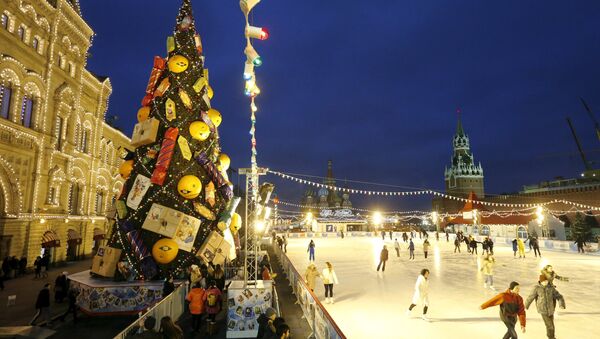"In this rural Trump-supporting town, home to barely 1,000 people and at least 10 Christian churches, the word "holiday" doesn't seem to exist," reads a report by the Washington Post, telling a story of Linden, a very Christian town in Tennessee which has reportedly never abolished — or been required to abolish — the phrase "Merry Christmas."
"We've always said ‘Merry Christmas,'" the report quotes one of the resident saying. "It offends me to see at the stores, where they just do ‘Happy Holidays' or ‘Seasons Greetings.' It should be ‘Merry Christmas.' Put Christ back into Christmas. That's what it's supposed to be… I just wish we would all get on the same page."
And some businesses have opted out of tradition for a non-religious "Happy Holidays!" with Trump's own businesses even being among this cautious flock, according to the Washington Post.
But is there any sense behind the issue? It seems that both sides are making a grave mistake, each in their own way.
Firstly — and most obviously — Muslims do not celebrate Christmas. It's not a holiday for the faith. Huffington Post's Sajdah Nubee, a Muslim born to Christian converts, provides a thoughtful insight of what Christmas means for a Muslim, and to summarize her essay, Christmas is just a social tradition one cannot cannot ignore because it's everywhere.
And for Jews, the traditional eight-day holiday of Hannukah occurs at different dates from early November to late December because of the lunar calendar used in Judaism. Simply putting a menorah next to a Christmas tree might signal a poor understanding of this particular religious tradition.
Since Muslims (and many other religions) have no specific holiday to occur on December 25, it doesn't seem to be a discrimination to wish a Merry Christmas to those who actually celebrate it. One might agree that wishing "Happy Holidays" works when there are two separate holidays for two religions, otherwise сhanging the salutation doesn't make sense.
However, the residents of Linden, as well as others who share their opinion, dwell within their own cultural error, as most Americans have never dropped the traditional salutation, according to the Washington Post.
As the newspaper points out, the very matter of whether or not one should say "Merry Christmas" was invented by politicians — and Trump in particular — to address a specific, albeit evangelical, audience.
"The evangelical vote was for Trump… And we're going to work together for many, many years. We're going to make it so good. We're going to be saying ‘Merry Christmas' again," the then-candidate said during a 2016 primary stump in Indiana.
Was it a problem? Debatable. However, creating an impression of a problem and promising to solve it works just as fine as any other rhetorical trick.
"Trump's "Merry Christmas" promise was about much more than the utterance of those two words in December — and he didn't limit this discussion to the Christmas season. Just like his pledge to "make America great again," Trump's Christmas promise meant different things to different voters," the website reads.
But how many believe this is an issue? Some people are suspicious of being politically correct, and the Washington Post quotes two persons on the issue.
"The government, I think, is trying to oppress Christianity with some of the policies that they come up with. They're trying to oppress it, force people out of what they believe in," said a 60-year old salesman who, naturally, voted for Trump.
"I think they should keep Christ in Christmas, which is what they said originally, and to heck with anybody that don't like it. Anybody that's Muslim or Hindu or Buddhist, let them do what they want to do, but don't criticize those that want to keep Christ in Christmas." said a property manager in her mid-50s.
The only thing the whole "Happy Holidays" issue has excelled at is confusing people and inflicting a manufactured fear of offending someone with something that is not offensive.
"Even people who are clearly celebrating Christmas in their homes tend to be conflicted about what to say in the workplace or at school. No one wants to offend anyone or make assumptions about people's religious beliefs, especially at work," writes The Guardian's Heather Long in an op-ed.
Long points out that the UK, in contrast to the US, being as multicultural a society as it is, has taken a totally different approach: instead of using a blank, neutral salutation such as "Winter Howdies!" they opted for celebrating all the parties of various religions instead.
"I'd rather have people wish me Happy Hanukkah, Happy Diwali or Eid Mubarak when those holidays come around. It makes me feel more a part of their celebration. Let's call each holiday what it is instead of trying to lump Jewish, Christian and even the Kwanzaa ritual together," Long writes in his article.
Quite a solution, and who would argue with that?
So, Merry Christmas from Sputnik News, Dear Readers, and May Peace Prevail on Earth.




